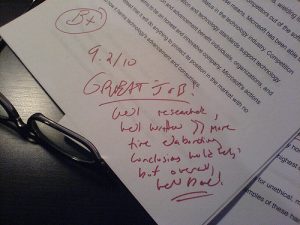These days, grading is central to the social contract that exists between professors and their students. Throughout the course of a semester, professors grade their students and at its conclusion students grade – or, as the lingo would have it – “evaluate” – their professors, and everyone’s the wiser, and the better, for it.

That’s the theory. On paper, things don’t work out quite so neatly. Students complain often, and bitterly, that the battery of tests and special projects to which they’re subjected do not adequately reflect their talents. Professors complain just as often and just as bitterly that the evaluations to which they’re subjected simply don’t add up.
Frustration mounts. Students lament the letter grade that is permanently incised on their transcripts, insisting that it’s not right that professors have the last word. But, from the professorial perspective, it’s the students who – quite literally – have the last word and often, it’s a real stunner.
Two examples will have to suffice. One of my cherished colleagues, for whom teaching undergraduates about the Holocaust is no mere academic exercise but a responsibility, decided recently to devote an entire year to the subject rather than cram the rise of Nazism, the growing dehumanization of the Jews and their subsequent extermination into one semester.
One of the students, when asked to account for his experience in the classroom, allowed how he was a bit disappointed with the first half of the course because it didn’t really dovetail with his interests, which extended only to the actual killing of the Jews. Still, he conceded, learning about anti-Semitism and the Nuremberg Laws and reading the memoirs of people such as Victor Klemperer who, in poignant and painstaking detail, recall what befell them was “surprisingly fascinating” (my emphasis). Hmm.
My turn. I had the good fortune earlier in the year to co-teach a course on The Merchant of Venice with another one of my dedicated colleagues, Professor Leslie Jacobson of the Department of Theatre & Dance. While she concentrated on the theatrical end of things, I sought to place the play within its historical context and to highlight the critical role played by the Jews in both the fashioning of the play and its subsequent reception.
I don’t think it’s too much of a stretch to say that they go hand in hand. To which one of my students – a very good, one, I have to say – wrote in her evaluation that in the event I teach this course again, other aspects of the subject should be emphasized, “not just Jews.”

